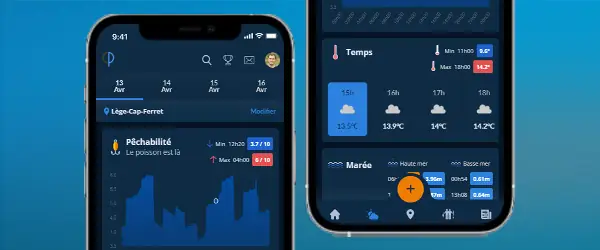
Read the article with FishingTheSpot: the weakfish
Keep an eye on this subject!
Thousands of species spotlights and techniques but also all the local information about your city!



Meet other anglers near you and share your fishing fishing trips, afoot or on a boat, at sea or in freshwater
See the fishing tripsThe Weakfish

mid-April to the end of May, then again in August
38 cm
Did you fish
this species this month?
The Weakfish belongs to the Scianidae family. The weight reaches 1 m long and 9 kg of weight. It has an average life span of 12 years. It spawns from April to August. It can be fished from mid-April to the end of May, then again in August and September.
Weakfish differs from other species in its genus by several meritorious characteristics: the anal fin on Weakfish has 11 or 12 soft rays, 11 to 13 gills, and the lateral line scales are between 76 and 86. In adults, the coloration of the dorsal scales is dark green and blends into the silvery underside. The coloring of the sides can range from purple, green, blue and gold spots that are usually found on the upper half of the fish. The fins are yellowish in color. The basic shape of the child's head is elongated and ends at a sharp point. The mouth is wide and oblique, with the lower jaw projecting beyond the upper jaw. The dorsal fin of fish is thorny, but the spines are flexible and usually the third or fourth spine is the longest. The anal fin is comparatively smaller than other fish in the same family as the white fish; its base ends slightly before the dorsal fin.
The Weakfish lifestyle
Weakfish attack a wide variety of species, including small school fish such as anchovies and Atlantic Menhaden, an assortment of crabs, shrimp, mollusks and even large zooplankton.
This spawning occurs in the shallow waters of estuaries. Their young are in the form of zooplankton, floating freely with the tidal current. They flow with these currents until they reach their growth area in rivers with low salinity. Once these fish have reached a sufficient size in these areas, they begin to move up into the saltier waters where they were spawned. They remain in this intertidal area of the bay until winter, then join the schools of fish towards the offshore waters. Males have the ability to produce a deep croaking sound. The reason these fish have the ability to do this is because they are part of the drum family. This trait is very common in species belonging to the drum family and is commonly used for mating purposes. It is believed that they also use this technique to attract other female.
The Weakfish habitat
Weakfish are found along the Atlantic coast. They migrate seasonally into the relatively shallow coastal waters of sandy bottoms, then into the brackish waters of river estuaries to breed and feed in summer, and finally return offshore in the fall. During the spawning season, the brackish waters of Chesapeake Bay are the most important habitat for fish.
This species of fish is native to the Atlantic coast of the United States and extends from Cape Cod to the Florida coast.
The Weakfish angling
They can be caught with a hook and line.


